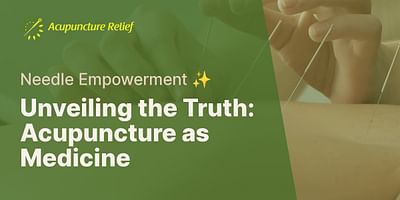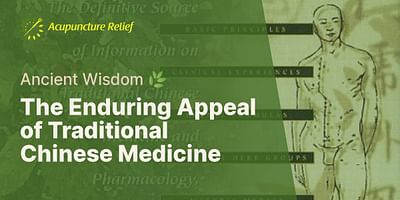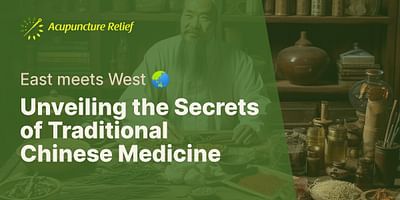James O'Reilly is a former professional athlete turned acupuncturist. After experiencing the benefits of acupuncture firsthand in his recovery from a sports injury, he decided to pursue a career in the field. He now has over 10 years of experience and specializes in sports acupuncture.
As an acupuncturist with over 10 years of experience, I often come across questions about the opinion of medical doctors on traditional Chinese medicine (TCM). It's important to note that opinions can vary among medical professionals, but I can provide you with a general perspective based on my interactions with doctors and the medical community.
Many medical doctors recognize the value of TCM and its long history of use in promoting health and well-being. While TCM may be considered an alternative or complementary approach to Western medicine, it is increasingly being integrated into mainstream healthcare practices.
Benefits of Traditional Chinese Medicine:
One of the reasons medical doctors have a positive opinion of TCM is due to its potential benefits. TCM takes a holistic approach to healthcare, focusing on the balance and harmony of the body, mind, and spirit. It aims to address the root causes of health issues rather than just treating symptoms.
TCM includes various modalities, such as acupuncture, herbal medicine, dietary therapy, and mind-body practices like tai chi and qigong. These techniques are believed to stimulate the body's natural healing abilities, promote circulation, reduce inflammation, and restore balance.
Medical View on Chinese Medicine:
While Western medicine primarily relies on scientific evidence and clinical trials, TCM has its own theoretical framework and diagnostic methods. Medical doctors often appreciate the unique perspective that TCM offers, as it can provide additional insights into a patient's health.
It's worth noting that some medical doctors may have reservations about TCM due to the lack of scientific evidence supporting certain practices or the potential for herb-drug interactions. However, many doctors are open to integrating TCM into patient care when appropriate, especially for conditions where Western medicine may have limitations.
Acupuncture Techniques by Doctors:
In recent years, there has been a growing number of medical doctors who have pursued additional training in acupuncture. These doctors often integrate acupuncture into their practice, combining the principles of TCM with their medical knowledge.
Medical doctors who practice acupuncture may use a more biomedical approach, focusing on specific conditions and utilizing acupuncture as a complementary therapy. This integration of TCM and Western medicine allows doctors to provide a more comprehensive and personalized approach to patient care.
Acupuncture Relief:
If you're considering TCM or acupuncture, it's important to consult with a qualified practitioner who has proper training and credentials. Acupuncture Relief is a valuable resource for finding licensed acupuncturists in your area. Our site provides information on various acupuncture techniques, benefits, and costs, helping you make informed decisions about your healthcare.
In conclusion, while opinions on traditional Chinese medicine may vary among medical doctors, many recognize its potential benefits and value in promoting holistic health. Integrating TCM with Western medicine can offer a more comprehensive approach to patient care, allowing for personalized treatment plans. If you're interested in exploring TCM or acupuncture, I encourage you to consult with a qualified practitioner to discuss your specific needs and goals.















